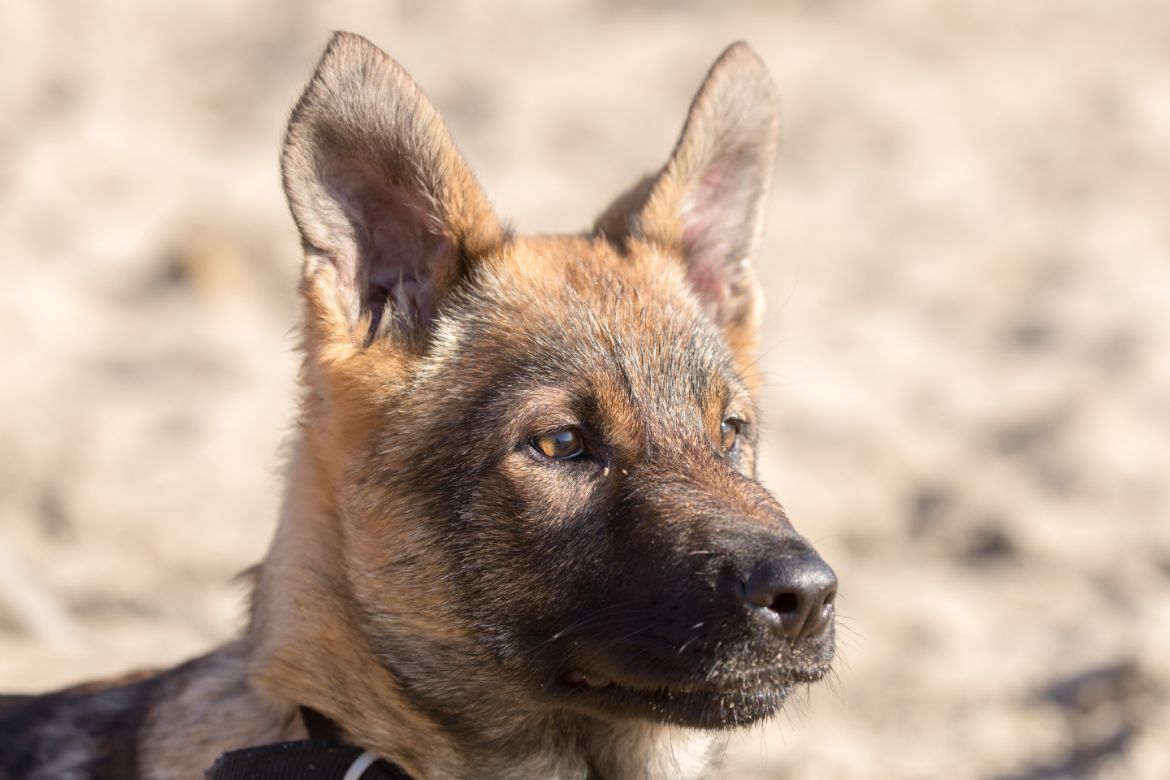Have you adopted a puppy with a slim frame and ribs sticking out? While many dogs are chubby and thick, German Shepherds often suffer from skinny frames.
And the term skinny frame just means your dog is too thin as compared to healthy individuals.
Here are some important facts about skinny GSD pups. Find out if your new puppy should be examined by a vet.
This puppy may have some vitamin deficiency. The best way to find out if your puppy has vitamin deficiency is to perform a blood test.
But neutered dogs may face this problem more often than intact dogs. Another reason that the pup may be skinny is because of bad eating habits or overfeeding.
To avoid this behavior, make sure that your dog’s diet consists of healthy, nutritious food. You should also make sure that your dog is not overfed or it may develop health problems.
How Do You Know If Your German Shepherd Is Too Skinny?
Contents
Weight loss in your German shepherd might be due to a variety of reasons, such as age. You will need to measure your dog’s weight every week, so that you can keep track of how much your dog weighs.
If you’re reading this, you’re undoubtedly a parent or breeder who’s concerned that your German shepherd has an unhealthy weight.
If your dog is overweight, that probably isn’t a good thing. There are many health risks that come from obesity, such as orthopedic and joint issues, breathing problems, and various heart problems.
In addition, your dog’s bowl size will get smaller. Your dog will probably drink less water than normal.
It might also develop skin problems, such as dandruff. Furthermore, your dog might be overweight for a variety of reasons, some of which have nothing to do with you.
However, there are a few simple signs to know your German shepherd is too skinny.
Getting a Feeling for Their Ribs
Running your hands along your dog’s ribs can help give you a feel for their dog’s overall health.
A dog with healthy ribs won’t have thin or very white skin. A dog with healthy ribs won’t have thin or very white skin.
You should be able to feel the ribs in a dog with a healthy body weight.
In addition, the ribs should fit together just loosely and not through tightened skin. To get a feeling for a dog’s ribs, touch lightly behind the base of the tail.
Your German shepherd’s ribs, on the other paw, are not as visible due to the lack of fat over them. They may appear very bony, but they are not “broken” or anything.
Looking Down At Them
Rise over your German Shepherd and look down on them while standing on the floor. Your German Shepherd should look like a fat, happy puppy as opposed to a malnourished puppy.
They should have a soft, full midsection.
Long, strong legs should be visible as well. Now, use your ruler to measure your dog’s circumference.
Specifically, measure the girth. Keep in mind that sometimes puppies will have slim midsections until they age into a larger size.
It’s also normal for the girth, or length, of the dog to be so narrow as the waist is expanded.
If the dog appears to be very thin, this could be cause for concern. If your dog has lost weight or has a lower body circumference, he will likely look very skinny.
Most German Shepherds are average in size, which means that they are neither too skinny nor too fat. If you’ve seen your dog lose a significant amount of weight, he may be suffering from nutrition and health problems.
If your German shepherd’s physique seems to lack any sort of shape and looks more squarish, they may have an eating disorder.
This condition, also known as cachexia, is a side effect of cancer and other diseases, as well as old age.
Why Is My German Shepherd So Skinny?
Each of the several causes likely contributes, and it’s a combination of all of them that determines whether or not your German Shepherd is skinny.
Your dog’s diet is the most important factor, so the first thing to do if you’re worried about its weight is to monitor its food intake. How much it eats each day is the single most important factor.
Your vet will give you a good indication of how much your dog’s ideal weight is, and you can use this as a guide to determine how much to feed it.
You should also weigh your dog regularly to make sure it’s never getting overweight.
It’s also important not to over think this; simply write down your best guess as to why the dog is skinny based on whatever comes to mind.
I’ll show you why it may be slim, here are all possibilities, and you decide which one you think is correct.
Anxiety
It’s possible that anxiety is the root of the problem.
Assuming that it was not always thin, this is more probable if it just become thinner as a result of an event that may be making it worried.
Something as simple as someone mistreating it, relocating, or a death of another pet might have triggered it to become frightened.
This is more probable if it wasn’t always thin. If a German Shepherd was always been thin, it may have been the result of it being underfed.
Someone mistreating it, changing houses, another pet dying and moving might be some of the reasons why my German Shepherd is skinny.
Having a positive influence on the dog’s life would be the best way to help it get healthy.
Illness
If your German Shepherd has suddenly lost weight, there is a possibility that this could be due to an ailment.
This is particularly probable if it has been losing weight for no apparent reason.
It’s crucial to take it to the vet if it decides to lose weight and if you’re at the risk of causing further complications.
Diabetes
Diabetes is another factor that could complicate a dog’s weight problem.
Diabetes changes your metabolic processes by altering the amount of glucose produced and consumed by the body.
This leads to a dramatic weight loss of 5% to 20%. German Shepherds, due to their captive-like environment, are more prone to this cause of weight loss.
They’ll discover alternate energy sources, such as turning to fat in their bodies, so they can keep living.
German Shepherds losing weight and becoming thinner is not an unusual thing, but it is a serious concern.
Renal disease, liver illness, and cancer are all possible side effects of a dog’s rapid weight reduction. As soon as you see any of these symptoms, contact your vet immediately.
It’s critical to contact your veterinarian and verify if they have discovered diabetes as a source of their dog’s weight loss.
Parasites
Worms and parasites may also one of the causes of sudden weight loss in dogs.
If your dog is lethargic or has lost a significant amount of weight in a short period, parasites may be the cause.
The quick weight loss in dogs may be signs of worms, parasites, and diseases.
Intestinal parasites may take advantage of your dog’s loss of appetite, causing them to become thin and frail.
Intestinal issues such as vomiting or diarrhea can be dealt with easily, however, weight gain that is caused by a parasite may require more care.
It’s critical to contact your veterinarian as soon possible if you notice anything is amiss with your dog.
Liver Disease
In dogs with liver illness, key nutrients such as vitamin B12, sodium, potassium, and magnesium will be poorly absorbed into the bloodstream.
The consequences of liver disease can be quite serious and life-threatening for a puppy or adult dog.
If your dog’s liver illness is severe, and your dog begins to fail to eat, he or she might stop eating and drinking altogether.
Sometimes, infections caused by worms, parasites, and bacteria may cause weight loss.
My German Shepherd is little and has trouble eating because his stomach does not process food fast enough.
Exercise
It’s possible that your German Shepherd is overweight. Maintaining a lean body mass is key to preventing obesity in your German Shepherd.
This is improbable, though, since German Shepherds were meant to work.
They are naturally athletic and have a significant amount of endurance. In essence, their body type is designed to perform some physically demanding tasks, and therefore you should not be alarmed by your dog’s thinness.
It’s more probable that your German shepherd’s idleness is due to boredom.
Many breeds of dogs enjoy standard exercise, but German Shepherds particularly enjoy digging and running through long grass. Socialization also plays an important role in their demeanor.
It might be beneficial to address this concern before it leads to health complications.
Age
It’s normal for your dog to age over time, and you may notice that your dog has less energy.
That explains why your handsome German Shepherd puppy was full of energy when you first got him.
However, as time passes, changes in your dog’s body become more pronounced. Your dog’s joints, eyesight, skin, hair, and teeth will see the most changes.
You can see his joints begin to deteriorate. Your dog’s hair will gray earlier.
These aren’t the only physical changes you’ll observe in an older German Shepherd. His eyelids become weaker and, as a result, your dog’s vision begins to diminish.
Although not all dogs are like that, some dogs will start slowing down as they get older.
This shouldn’t necessarily stop you from meeting their exercise needs, though. Some dogs still need physical activity and mental stimulation.
In fact, your dog can benefit from lap-time just as much as they did when they were younger. There are a lot of things your dog can do to keep them active.
They can chase balls around, or chase them around the house or yard. As long as your dog is getting some exercise, it shouldn’t matter if they’re getting less of the exercise that they usually do.
Dental Problems
Have your German shepherd ever experienced a dental problem?
If so, you may have just decided that your pet is too thin. You may think that skipping meals will help your dog lose weight, but this is actually counterproductive.
If your dog is losing weight from not eating, it is most likely because his or her health is suffering.
The same thing might apply to pulling or limping when walking. It may not be painful, but if your dog is limping, they may have a dental issue that’s causing them to limp.
They may be in discomfort when they eat if dental problems are not taken care of.
They may opt not to eat or drink at all until the problem is resolved. This may mean your German Shepherd is underweight.
While they may be hungry, they may not want to deal with the pain of eating.
They would rather just skip a meal. This psychological ailment is known as “food phobia”.
Food phobia can result from any number of reasons, including lack of nutrition, pain, or anxiety. According to one study, food phobias can cause significant weight loss in many dogs.
While similar conditions are fairly common among dogs, they can be serious and should be treated by a veterinarian.
Also Read: Is Your German Shepherd Overweight?
Conclusion
Your veterinarian may suggest making some changes or additions to your dog’s diet if you are noticing his lack of weight and underactivity.
Nutrition is one of the single most important factors in regards to getting your dog the weight and activity they need, and maintaining a healthy, active lifestyle will improve their quality of life.
You may not be able to be with your dog constantly, so be sure to keep them healthy in other ways.
Give your furry friend plenty of exercise every day, even if it’s just a few minutes of chasing a stick or fetch. Make sure your doggie has plenty of food and water to keep them hydrated and healthy.
Make sure that you are feeding your German Shepherd well-balanced foods, like healthy pet treats or kibble, which can be easily digestible and won’t leave your dog feeling bloated.




